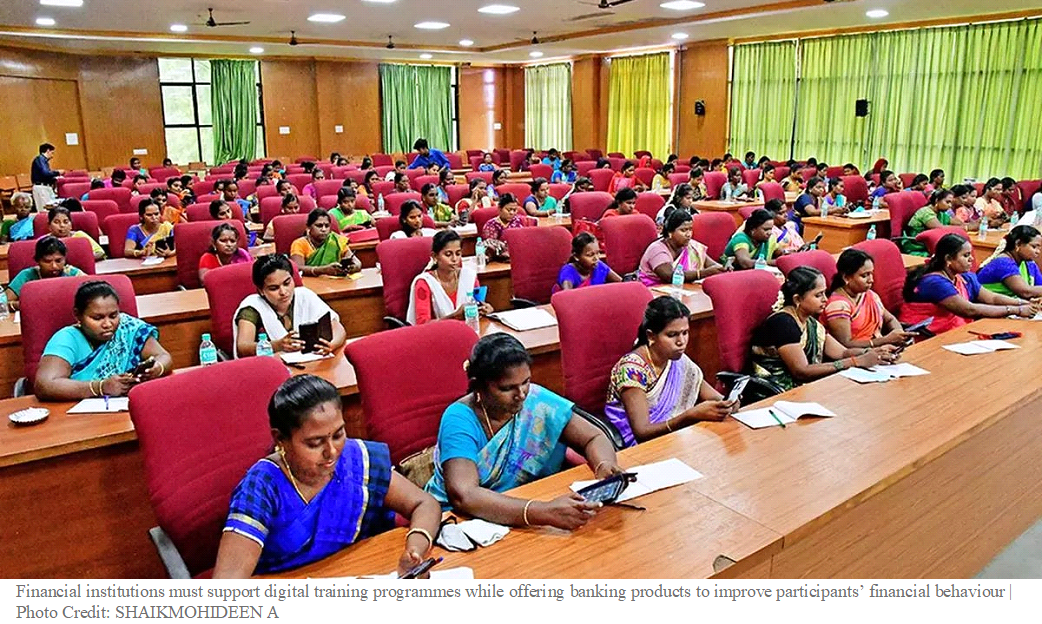What’s the secret behind creating ‘lakhpati didis’?
21 Feb 2024
Opinion: Ashish Desai and Rudra Sensarma.
To become a Lakhpati Didi, a critical skill is digital financial literacy — financial knowledge and the ability to take effective decisions
On our way to Kolhapur, we stop at a tea stall-cum-convenience store run by Savita tai (name changed), who greets us with a smile.
While sipping tea, we overhear her discussing the delivery of spices to a shop in Pune. Upon enquiring, she narrates that her ‘gat’ (self-help group or SHG) provided her capital along with training to elevate her tea stall to a small business of convenience store and spice manufacturing.
Slowly, she has been able to increase cash flows and save for her daughter’s college education. Saviti tai is possibly one of the Lakhpati Didis (women SHG members with annual income above ₹1 lakh) mentioned by Finance Minister Nirmala Sitharaman in her recent Budget speech. The Budget has increased the target for the Lakhpati Didi scheme from 2 crore to 3 crore women.
Lakhpati Didis are a part of the 63 million micro enterprises in India, where an informal woman entrepreneur achieves economic empowerment through active labour force participation.
Informal entrepreneurship does not match the prevailing Western idea of an entrepreneur. In developing countries, it describes necessity-based entrepreneurship which creates employment for individuals with low educational levels, little to no work experience, and a lack of access to formal finance and business networks.
Despite such constraints, informal entrepreneurship plays a significant role in augmenting economic empowerment of rural women in India.
Role of SHGs
Supporting rural women in this journey are approximately 83 lakh SHGs. SHG is an informal but self-governed and peer-controlled association of 10-25 people, who come together to find ways to improve their livelihoods and financial wellbeing.
Formation of SHGs is typically facilitated by NGOs such as Self Employed Women’s Association (SEWA) or State Apex SHG bodies such as Maharashtra Arthik Vikas Mahamandal (MAVIM) in Maharashtra or Kudumbashree in Kerala. These organisations support the SHGs not only in accessing capital but in developing skills and agencies.
To become a Lakhpati Didi, a critical skill is financial literacy — financial knowledge and the ability to take effective financial decisions. With the advent of digital technologies and increasing digital banking penetration, financial literacy must now be relooked in a digital context.
Individuals need to supplement their financial literacy with digital skills such as the ability to operate digital devices, conduct financial transactions digitally and be aware of potential frauds. These digital abilities when combined with financial literacy can be termed as Digital Financial Literacy (DFL).
To support SHGs in providing financial literacy training, the financial regulator has formed the National Centre for Financial Education (NCFE) that conducts seminars, workshops and training on financial education.
However, the existing financial education curricula need to be broadened by integrating modules on UPI usage, banking transactions, and fraud awareness.
Hands-on approach
Moreover, such training should go beyond the standard lectures or videos and must be supplemented by hands-on application with banking products made available to the training participants, creating ‘teachable moments’.
Our research conducted on women micro-entrepreneurs points to a strong relationship between DFL and loan repayment and savings behaviour. Therefore, financial institutions should not view DFL training as a CSR activity, but as an integral business function supporting healthy portfolio growth.
DFL has important implications from a macro-stability perspective as well. Strong DFL can be a demand side driver of improved financial behaviour and can complement the recent regulatory tightening on unsecured loans.
According to the RBI’s annual report, during the period 2021 to 2023, while the value of financial frauds has nearly halved to ₹30,252 crore, the instances of frauds increased by 43 per cent to 13,530. Frauds are predominantly attributed to digital payments, underscoring the importance of DFL in securing financial stability.
The regulator, NGOs and financial institutions must make DFL a priority. At a micro level, DFL is an important component of capability development to create empowered entrepreneurs and many more Lakhpati Didis.
At a macro level, DFL can strengthen demand side behaviour which will help in the mitigation of systemic risk and support the nation’s march towards ‘Viksit Bharat’ and ‘Atmanirbhar Bharat’.
Desai is a PhD from IIM Kozhikode and a development sector professional as well as visiting senior fellow at NCAER; Sensarma is a Professor of Economics at IIM Kozhikode.
Published in: The Hindu Business Line, 21 Feb 2024






